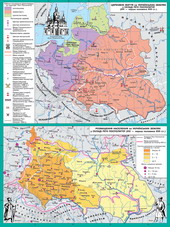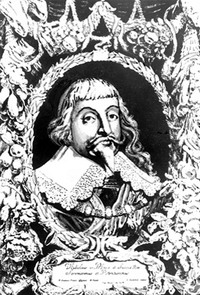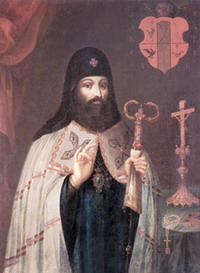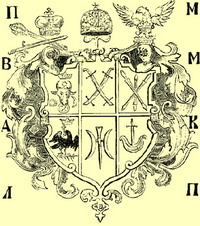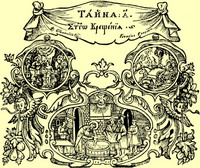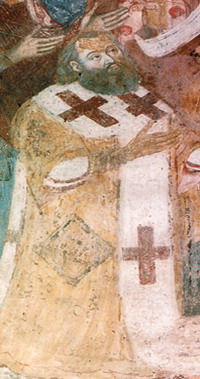church life in the first half of XVII century.
Principal PROCEEDINGS
- Brest union did not support the majority of Ukrainian, and it led to this union of two churches, and attempts to Rome and Poland use it for political purposes contributed to a dramatic struggle between the Orthodox and Greek Catholics.
- In a national-religious oppression in Ukraine guarantees preservation of the Orthodox faith acted as the Cossacks.
Thanks - Cossacks restored and officially recognized by the Government of the Commonwealth Orthodox Church hierarchy, were treated successfully adapted and resisted the spread of Catholicism.
- Metropolitan Peter May - an outstanding educator and organizer of church life.
Chronology of events
|
1599-1613 he |
Activities Uniate Metropolitan Ipatii Potii. |
|
1613-1637 he |
Activities Uniate Metropolitan Joseph-Velyamina Ruts'kyj. |
|
1615 |
Foundation Kyiv Brotherhood and school with him. Start of printing Kiev-Pechersk monastery, established Elisha Pletenetsky. |
|
1620 |
Restoration of the Orthodox hierarchy. The election of the Orthodox Metropolitan of Kiev Job Boretsky. |
|
1632 |
Adoption Polish Sejm "Articles for calming the Ruthenian people". |
|
1632-1647 he |
work of the Orthodox Metropolitan of Kiev Mohyla. |
FIGURES
Ipatii Potiy - Kyiv and Galician metropolitan prominent writer-polemicist, who ardently defended the union. One of the initiators of the Union of Brest in 1596 after the death of Metropolitan M. Romance (1599) was a Greek Catholic Kiev Metropolitan.
Vladislav IV - King of Poland (1632-1648), son of Sigismund III. Cossack needing help in the war with Moscow, the recognition of Ukrainian Orthodox Metropolis in 1632 when the war ended, failed to fulfill its obligations for benefits Cossacks. During his reign occurred Pavlyuk rebellion and the revolt led by J. Gun and J. Ostrainyn, suppressed with great brutality.
PERSON
Job Boretsky was born in the 70's the XVI century. in Birch on Peremyshlschyni in a family of small nobleman. He studied at the Lviv Brotherhood School and then at a European university. His education, became a teacher of Greek and Latin in the Lviv Brotherhood school, the rector of which he was elected in 1604 from 1614 Boretsky - Kyiv priest. Participated in founding of Kiev and its Brotherhood school of John Boretsky fell to be its first rector. Whether during his principalship, or later John Boretsky became a monk under the name Job. In early 1618 Boretsky Abbot of St. Michael's Monastery in Kiev, and in 1620 Patriarch Theophanes of Jerusalem ordained him to the Metropolitan.
Peter Graves was born in a family Moldavian master Simeon and Princess Margaret of Hungary in December 1596 when Simeon died in 1607, family was forced to leave Moldova . Since then, home for Peter Graves was the Ukraine. Peter Graves received a sound education: studied at the Lviv Brotherhood school Zamoyski Academy, and perhaps even in European universities. He was the military, having a commander of Polish troops guardians Pototsky, Crown Chancellor and Hetman S. Zolkiewski. Participated in the Battle of Khotin (1621). Later in postryhsya monks. Since 1627 he - Archimandrite of Kiev-Pechersk Lavra, the 1632-1647 biennium - Metropolitan of Kyiv and Galician. In 1631 founded the Monastery of the Caves school which in 1632 united with the Brotherhood school at the hem, thus there Kiev Academy. Orthodox Church canonized.
Beresteyska UNION INFLUENCE ON THE DEVELOPMENT OF CHURCH LIFE IN UKRAINE
- worsened the Union of Brest the Orthodox church, but she remained faithful to most of that time the Ukrainian population.
Deploying - struggle for restoration of human afflicted Church, which joined representatives of all strata of Ukrainian society, and led them fraternity.
- Brotherhoods gave broad powers stavropihiyi right, that he received some of the Eastern patriarchs.
Note
. Stavropihiya - Autonomous Orthodox unit (church, monastery, fraternity), which is not subject to the jurisdiction of local bishops and the patriarch directly, and enjoy special rights.
- stauropegian except Lviv Dormition, in 1620 were the cavern and Kyiv Epiphany Brotherhood.
- right stavropihiyi little critical to preserve the Orthodox Church. Because after the Union of Brest almost all Orthodox bishops are Uniates. Faithful Orthodox were only two bishops: Lviv Gideon Balaban and Michael Peremyshl Kopystyansky. After their death was the only Orthodox bishop Tysarovskyy Jeremiah, who managed to occupy Lviv Department, assured the King that he - Uniates. After the death of Jeremiah, the Polish government could, using the absence of bishops, the Orthodox Church to declare non-existent.
- fraternities Convert to a powerful force capable of fighting for the Orthodox faith, was gradually. the beginning XVII century. Brotherhood - a rather influential religious organizations. For example, they were entitled by their priests to wean his parishioners from the church, careful adherence to regulations etc. priests.
- work of the Orthodox brotherhoods took care of the Cossacks, who were among many brethren. Cossacks supported the Brotherhood and the Orthodox Church not only funds but also by military force. With the support of the Cossacks in 1615 in Kyiv Epiphany Brotherhood was founded, and its accession to it, Peter Konashevich-Sagaidachnogo Zaporozhian Host with all testified that the Cossacks took the Orthodox faith under the care and protection.
- It is the assistance of the Cossacks in 1620 was updated higher Orthodox Church hierarchy.
Greek Catholic Church
C tanovysche
- Uniate bishops, contrary to assurances Polish authorities have not provided the same rights as their little Catholic clergy, so to achieve equality of churches, as supporters hoped the union, they could not.
Go to the Uniate Church - majority of Ukrainian population as authors sought to someone else, formed through the betrayal of their ancestral faith. In addition, the Commonwealth government support in the struggle against the Ukrainian Orthodox Church.
- situation around the Greek Catholic church property disputes and fierce: as Uniates and Orthodox churches and monasteries all Greek rite believed her.
- of the Greek Catholic Church resorted to vigorous measures to overcome the crisis of his church.
- Ipatii Potiy , who was called "father of the Union", after the death of Michael Romance, became metropolitan.
- was a gifted preacher, writer, polemicist, administrator, however, in the struggle for union operated mostly by force.
- Metropolitan Joseph-Velyamin Rutsky has put much effort to build the Uniate Church.
- Unlike its predecessor - Poti, Rutsky particularly concerned about improving the education of clergy, aggressively sought ways to communicate with the Orthodox, they believed in harmony major requirement exaltation of both churches.
At the same time he opened - activities aimed at streamlining and updating of church life, laying the new monastery, has been implementing strict discipline among the monks, concerned with the establishment of the Uniate seminary, although it is open enough money.
- Uniate monks carried out the reform, which was consolidated into one order - Basilian. Like the Jesuits, Basilian engaged in educational and missionary activities.
RESTORATION Orthodox hierarchy. METROPOLITAN Boretsky Job
- rebuilding of the Orthodox hierarchy higher 1620 a lot of effort put Job Boretsky .
- great hopes in the revival of the Orthodox Church, Metropolitan Boretsky placed on education and typography.
- As the founder and patron of Kiev sister school, he encouraged her own expense.
Job - Boretsky rallied around the constellation of talented scientists, educators, particularly Smotrytsky, Peter Graves, Lawrence Zyzaniya, Elisha Pletenetsky.
- close associate of Metropolitan Peter Cossack chiefs were Konashevych-Sahaidachny, Michael Doroshenko, Olifer Golub. In the fight against the union Boretsky relied primarily on the Cossacks.
Metropolitan Petro Mohyla, HIS ACTIONS OF LIFE CHURCH Ordering
- Peter May won the metropolitan department 1632
- First of all he achieved recognition from the royal power of higher Orthodox Church hierarchy. 1632 the newly elected Polish King Wladyslaw IV signed the "comfort items Ruthenian people," which Ukrainian and Belarusians returning lost after the Union of Brest of law:
- recognized by the Orthodox Metropolitan of his right to have and bishops;
- defined conditions resolve disputes between the Orthodox and Greek Catholic churches and lands of others.
Activities Peter Graves to update church life
- introduced permanent supervision of clergy discipline, order of worship and more.
- necessarily constant proclamation educational sermons priests to parishioners on Sundays and on holidays.
- Prohibits magnates to interfere in religious affairs in their estates.
- Increased content and renovation of the church books.
- Povertalosya property and land Ukrainian Orthodox Church.
- Restoration Orthodox sacred places.
- increase cultural and educational level of Orthodox priests.
value of Peter Graves, aimed at building the church and cultural life of Ukraine can not be overstated. It is not the time during which he was metropolitan, called Mohyla era. Kiev Metropolitanate by Peter Graves was the most independent and authoritative.
Ukrainian Orthodox Church in the middle XVII century. become a significant force in national and religious liberation. coincidence main slogan of the National Liberation War of the Ukrainian people against the Commonwealth, which began in 1648 was to fight for the faith.
 English
English
